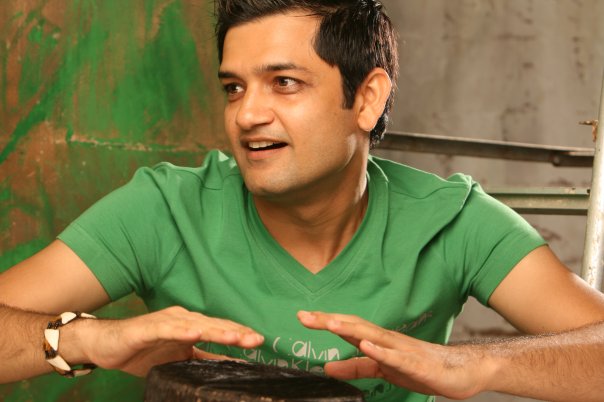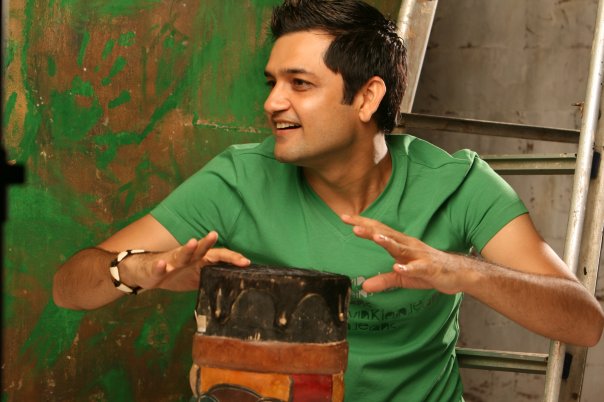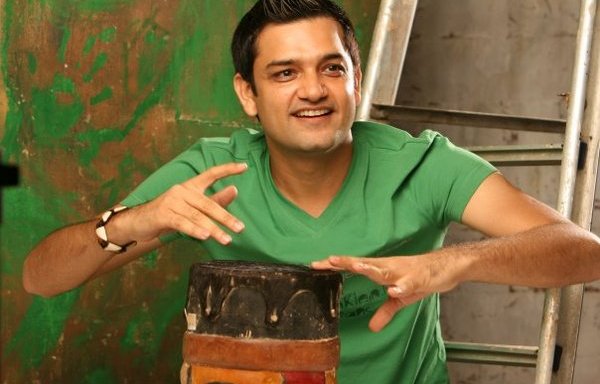When audiences step into a theater to watch a movie or turn up the volume on their favorite song, what they are witnessing is the end product of a thousand minds working together to create a few moments of joy for you. One such person in the multi-talented Mayur Puri. A lyricist, writer and music composer, he is responsible for an extensive fraction of the work Bollywood produces. We sat down with Mayur for a heart to heart on his journey, his experience and much more. Here is what he had to say!
From an aspiring filmmaker to a successful lyricist, what has your journey been like this far?
Every journey has it’s ups and downs. I think I’ve had a fare share of my own good times and bad times. If I were to look back, I could write three books on my journey so far.
The first one would be set in Gujarat – and would be quite a buildungsroman – a coming of age book , if you may say so, about how I, a teenager studying science, veered off towards literature and liberal arts and how I taught myself to survive in this industry without any formal training. I started writing poems in school and went on to write and direct plays and television shows during college. But I always wanted to be a part of the movies. The big screen had an alluring call that wouldn’t let me sleep at nights. A few years after college, I finally managed to pack my bags and landed in Mumbai.
The second book would be about me arriving in Mumbai and being hurled into this big bad world of Bollywood. Funnily enough, I had a reverse struggle graph. I didn’t struggle to get work when I came but my first real struggle started after I had achieved what I sought while I was in Ahmedabad. I was already a successful writer and I took upon a directing stint. For two years I just gave everything that I had to that project. But sadly, due to creative differences with the producer, I had to let go of that project. And that was not all, my producer left no stone unturned in bringing disrepute to my work and my abilities. The image, the brand value, the goodwill that I had worked a dozen years to build was all lost in a matter of days. I had no more projects and it seemed like my life was over. It was a big blow and the most frustrating time in my life. Thankfully, my wife stood by me like a rock and with the help of a few friends I bounced back as a writer.
The third book would be about my journey from severe depression to outrageous success that I have got in the recent years. I think that material for that book is still under development and like I said, if I looked back I could really detail out each of these books, but hey… who’s got the time to look back! I’m enjoying the ride for now and I feel like I have just started off.
Some things you do to feed the stomach and some to feed the soul. How true is this statement to your career struggle if at all?
Good question! And very true for a lot of creative people that I know. But in my case I don’t look at it like that. I used to. Sure, I did and I’d be lying if I said that money didn’t matter ever. But not anymore. Firstly, being a writer you cannot isolate your work from your soul completely. There will be a little bit of me in everything I do. The characters, the plot situations and the words I use are just vehicles. What I’m essentially transporting is my thoughts to the audience and my thoughts come from who I am. The things that you do to feed your stomach as a writer are not so much about your writing, but about allowing other people to dictate your writing. I’ve been a hack. I’ve been a scribe. And it does pay easier but I swear, it’s not fun at all. And then I’ve done things just for my soul and in the longer run they have paid me more than the things I did for money! So then, what is wise? I’ve realized that if you want to sustain longer and if you have your eye on the future, you should only feed your soul. A hungry soul is far more damaging than a hungry stomach.
You come from a non-filmy background. How difficult was it for you to step into the world of entertainment . Was your family supportive of you?
Not at all. I came from a middle class family of a small town. And those were not today’s times when being a media professional is ‘cool’ and a viable career option. In our times, all kids in school were gonna be doctors, engineers or government job holders. That was it. There were no other options to consider. I used to say in family gatherings that I’ll grow up to be a writer and the elders would say: ‘That’s alright, but what job would you do?’ Writing was not a job. It was a hobby. A pass time that you indulged in, if your family was liberal enough. My parents loved me but they constantly dissuaded me from coming to Mumbai and trying my luck as a writer. In fact, I ran away from home and came to Mumbai, with just 700 Rupees in my pocket. Luckily, I made it because I had a support system of a few friends here otherwise who knows, I’d have to sleep on the footpaths as well, like so many strugglers. But I don’t blame my family. They tried to stop me out of love and affection. They were being protective. And because I was alone in Mumbai, I probably worked harder than anyone else and never took for granted any opportunity that came my way. Today’s kids have it easy. I see parents running pillar and posts for their kids to get into media. I wish I had that luxury 🙂
You have worked with Pritam since the start of your career. What is it like working with him?
Pritam, is my best friend in the music industry. I’ve said it before and I’ll say it a thousand times more that today, if I am a successful lyricist its only because of Pritam. Songwriting was just a way for us to hang out together initially. We never took it seriously earlier. In fact Pritam doesn’t just work with me, he almost tolerates me. I’m a bit fickle with time and deadlines and I need to be cajoled to bring out my best and Pritam does that hand-holding like no one else can. His belief in me as a songwriter is more than my own belief in myself. Work is just a byproduct of me hanging out with him. Our friendship goes beyond our work.
Tell us a bit about Story Circus. What prompted you to found it?
In the most depressing phase of my life, I thought of starting something positive. I was down and out in 2009 because of my fall out with the producer of my first film as a director. That dream had sunk like Titanic but I didn’t want to become a bitter person. Luckily, my wife Ulka, had been researching on storytelling at that time and Story Circus was her idea that I took over and graduated upon. Ulka was a lecturer at graduate level and teaching college kids for over a decade had turned her into an excellent storyteller. Our first son, Aravir was about 5 years old and Ulka was pregnant with Abhisar, our second son. We started Story Circus to share the stories we developed for our kids with other kids and like minded parents. It was a joyful adventure through and through and though we lost a lot of money due to my idealistic foolishness and lack of business acumen, Story Circus gave us a lot of smiles and evolved us into better parents and better human beings. That itself was worth doing it. I don’t have time for Story Circus now, but Ulka still does story sessions for small groups of kids off and on.
The ABCD franchise is considered India’s first official dance film franchise. How different is it writing a song for a dance film versus a serious drama or romantic comedy?
There’s a lot of story-telling that happens through songs in Remo’s films. You cannot separate dialogue from the songs, because together they take the screenplay forward. Most of the songs are situational and involve multiple characters. It is different and fun. It is challenging to be able to hold audiences through 10 odd songs in the film but I think Sachin-Jigar, me and Remo have managed to do that. Most of the times, songs in Indian films are suspension of an emotion. You reach a point in the story where you want the audience to soak in the emotion and the occasion, happy or sad whatever it is, and that’s why you have a song. But in a dance film, the songs have more functions than to just suspend the emotion. It has to take the story forward.
What has your experience been like working with Sachin-Jigar?
Sachin-Jigar are like my younger brothers. They are both very funny. They are different from each other in many ways but when it comes to songs, you have to see how much in synch they are. It is unbelievable. There have been times when they have just made a bed or a groove for the song and the melody is still not composed. They’ll loop the bed and it will keep on playing over and over again in the studio. Everyone will be quiet and then suddenly both of them will start humming the same melody! It’s bizarre. It’s like they are musical-twins. We have a lot of love and respect for each other. And work, just like with Pritam, is often the by-product of us hanging out together. Only thing different is that in Pritam’s studio, he does the hand-holding for me and in Sachin-Jigar’s studio I do the hand-holding for them. Any why not? Main bada bhai hoon!
The audience is still raving about the songs of ABCD. How difficult was it to top those songs in the second film?
It’s always difficult to cater to the expectations of a fan base. When we started working on ABCD we had little to lose but if we didn’t deliver in ABCD2, it would have been shameful. When we started working on ABCD2, we were a little bogged down with the pressure and were not able to crack anything for the first few days. Then one day I told Sachin-Jigar to remember the process of ABCD. We were having fun, there was no pressure. I told them we must work on ABCD2 like that only. As long as we would enjoy the process, the songs would turn out to be good. Another important thing was to move away from the temptation to make run of the mill commercial songs. For ABCD2 it was more important that songs work in the film rather than just being generic songs that could be fitted in any other film.
Whom do you consider to be your biggest competitor in the industry?
Well, to be able to say who are you competing with, you must be sure of who you are. Fortunately, I don’t give myself that much importance to look in the mirror and ask: ‘Who are you really? Are you a writer? A poet? A lyricist? A filmmaker?’ I think I’m in the process of becoming Mayur Puri. I don’t know who he is. He is still evolving. I really don’t know which race I’m running, so the question of who I am running with is far away from my mind.
What are some thoughts which go through your head when writing a song or dialogue?
Mostly, it is the thought process of the character I’m writing for. Being a writer requires the skill to be someone else at the drop of a syllable. When I write for a Charlie in Happy New Year, I become Charlie and write ‘Kismat badi kutti cheez hai’ because he has been dealt bad cards in the poker of life. He is single mindedly driven by his revenge. But when I’m writing for Pawan in Bajrangi Bhaijaan, I write about Hanuman, because that’s what he is thinking about. So, I’m only voicing the stream of consciousness that runs through my characters’ heads.
What was your reaction when you heard one of your dialogues on the big screen for the first time?
It was 2002. ‘Mere Yaar Ki Shadi Hai‘ was my first film as a writer. It was quite a surreal feeling to see 500 people in the trial show reacting to the dialogue just as I had intended them to react. When I wanted them to laugh, they were laughing. When I wanted them to be emotional, they were misty eyes. In that moment, you feel extremely powerful. Almost God like. But you soon learn to live with the fact that it’s all temporary and next day you still have to go to work like everyone else. 🙂
If you could rewind the hands of time, what would you have done differently?
Nothing. I am here because of the mistakes I made. I have no regrets.
What advice would you give to aspiring writers, lyricists and your fans?
I don’t think I have fans. A small dedicated audience, that looks forward to my work, yes, but fans, no. I’m not a star. I’m just a writer. Good looking writer, but still, not so famous. So I don’t like being in this position to dole out advice as if I’m some high-handed priest of writing. But I can share my experiences and if that helps someone, great! My experience is that more than your actual work, people will judge you upon how you conduct yourself. How you are as a person. And that is the most important thing to learn. Be good. Be nice to people. Be helpful, kind and don’t fuel your egos. People will forget your words, but they will never forget how you made them feel.



